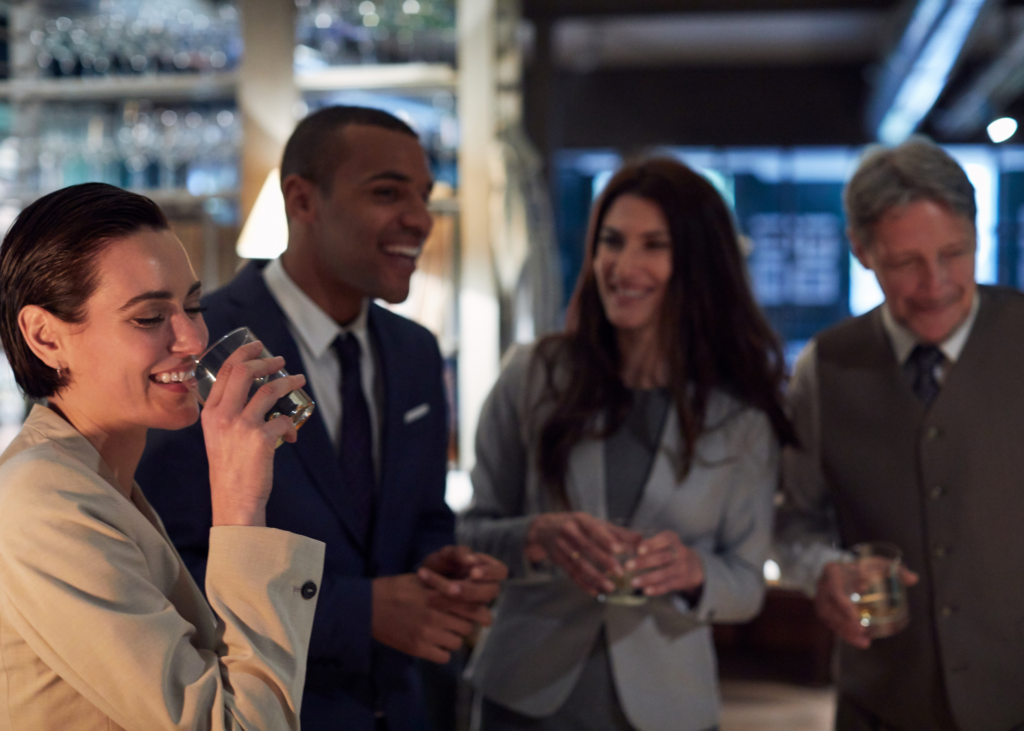Understanding alcohol culture across the globe is vital when you invest in international business relations. Most professional relationships in the modern business world eventually lead to sharing a drink or two. And understanding your clients’ culture when it comes to alcohol consumption will help you navigate business meetings, dinners, and even social gatherings more effectively.
In some cultures, how you conduct yourself under the influence is even considered indicative of your integrity and trustworthiness. It sounds like a risky game to play! But really, it’s all about understanding international alcohol culture. Read below as we share how to build lasting partnerships and how to avoid missteps when business mixes with pleasure.

The Role of Alcohol in Global Business Culture
As previously mentioned, there will most likely come a time where you will indulge in alcohol in an otherwise professional setting. Your colleagues may invite you out for a drink after work. Or, in a slightly higher stakes scenario, a potential client may want to have a discussion over dinner. And, this isn’t anything new. Alcohol has long played a role in professional settings and often symbolizes trust, celebration, and respect across cultures.
In many countries, the ritual of sharing a drink seals a deal or honors a new relationship. In others, offering the wrong kind of drink (or offering any drink at all) can be seen as careless or disrespectful. Some cultures associate consuming alcohol in excess with a lack of discipline. While you may find that other international business associates will shake your hand for being able to handle your liquor.
When navigating international business relationships, understanding these nuances is vital if you wish to demonstrate true cultural fluency.
Alcohol Culture Around the World: Cultural Toasting Traditions in Business
When professionals travel abroad, the nuances of alcohol etiquette can shape first impressions. Here’s how some of the world’s most influential business regions approach alcohol culture:
Japan
In Japan, alcohol typically serves as a social bridge. Sharing a drink amongst your fellow professionals can break down hierarchical boundaries after the formalities of work environments and even business meetings. Business dinners, referred to as “Nomikai”, allow colleagues to socialize in a more casual setting. And, it’s usually during such an occasion that “Kampai”, a traditional toast, will take place. It is etiquette to wait for the host to initiate this toast.
Another rule to keep in mind is that you should never pour a drink for yourself. Always pour for others and let them pour for you. It’s also respectful to hold your glass lower than your senior colleagues or business associates.
Foreign professionals should participate in these rituals as a sign of connection. While declining is acceptable, doing so with politeness and gratitude is key.
Germany
In Germany, beer and wine are cultural staples tied to regional pride and tradition. So, it goes without saying that business dinners and gatherings are bound to include drinks! And, you can certainly expect the traditional toast “Prost” to take place too. The most important etiquette during this toast is maintaining eye contact – failing to do so might indicate mistrust or disrespect.
Other German drinking etiquette includes; always taking a first sip before setting your glass down, and never crossing arms when clinking glasses. In German business culture, showing respect for precision and professionalism means participating in toasts attentively. However, excessive drinking can detract from the disciplined image highly regarded in this environment.
France
The alcohol culture in France is rooted in sophistication as well as appreciation. Wine is central to many meals, but the key is to enjoy it slowly, and savor it with good food. Toasting is often understated, with phrases like “À votre santé” (to your health). While drinking etiquette is more relaxed, politeness is still appreciated. Gestures like pouring for others before pouring for yourself and savoring wine shows great respect for French tradition. As an international professional, mirroring their alcohol culture will demonstrate cultural awareness as well as refinement.

South Korea
Alcohol in South Korea is deeply intertwined with workplace culture. Sharing soju or beer during business dinners, know as “hoesik”, is a way to build trust and strengthen bonds. The ritualized etiquette reflects respect for hierarchy. For example, a junior should always pour a drink for a senior. And when drinking in front of someone older, it’s polite to turn away slightly.
Refusing a drink may be considered disrespectful, but accepting only a little and pacing yourself is usually more acceptable. In South Korean business culture, adapting to and respecting the hierarchy-driven drinking etiquette is crucial and highly valued.
Middle East
In many Middle Eastern countries, alcohol is restricted or forbidden due to Islamic beliefs. Offering alcohol here may be disrespectful or even offensive. Instead, one can express hospitality through elaborate coffee or tea ceremonies. Never assume that alcohol is acceptable when navigating business relations in the Middle East. And, even when you’re uncertain, it’s always best to offer non-alcoholic alternatives.
USA and UK
Alcohol plays a significant, though different, role in business socializing in both the U.S. and the U.K. In the U.S., business meals may or may not include alcoholic beverages, and it’s common to hear casual toasts at networking events. Conversely, in the U.K., pubs frequently serve as laid-back venues for business discussions over drinks.
For both countries, participation is optional, but drinking in moderation is best. In the U.K., refusing a drink can sometimes raise eyebrows, but overindulging is far worse. In the U.S., the safe approach is to follow the host’s lead!
Alcohol Culture in the Business World: Tips for International Business Professionals
1. Do Your Research
Always research the alcohol culture of your destination. Understanding the expected etiquette shows respect and preparedness.
2. Be Aware of Risks
Recognize where cultural alcoholism or excessive drinking could harm professional judgment or company reputation. In some regions, heavy drinking is tolerated socially but frowned upon professionally. Balance is key.
3. Respect Local Customs
Whether it’s raising a glass with colleagues in Germany, sipping wine slowly in France, or politely abstaining in Dubai, align your behavior with cultural expectations.
4. Offer Thoughtful Gifts
Gift-giving can be one of the most seamless ways to honor alcohol traditions without overstepping boundaries. A carefully chosen bottle of wine or premium whiskey can communicate respect for local norms while strengthening professional relationships!

Embrace International Alcohol Culture with Drinkable Gifts
By respecting alcohol culture worldwide, businesses can avoid risks, honor traditions, and strengthen relationships. The key is finding balance. Celebrate where it’s welcomed, abstain where it’s not, and always prioritize professionalism. And when you pair this with thoughtful gifting, you are bound to make a positive impression! Discover our convenient corporate gifting solutions to send gifts to your business partners, worldwide.
Thank you for exploring Alcohol Culture! Here’s what to do next:
- Create branded corporate alcohol gifts quickly and easily!
- See our efficient gift delivery timing to different countries.
- Discover how to order corporate alcohol gifts in just a few clicks.
- Find more drinkable tips on our blog or
- Subscribe to our newsletter to get discounts and fun content!

Alex is a hopeless romantic who was supposed to be born in Italy (her dream destination), but proud to be South African nonetheless. She lives by her heart, and, consequentially, leaves a little bit of herself in everything she writes. She wholeheartedly believes that mermaids (and fairies) exist and is deadly afraid of the age ’30’.
